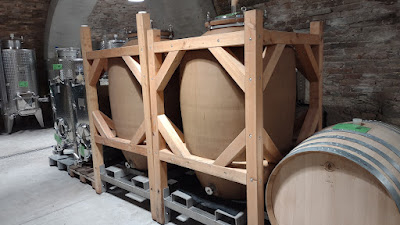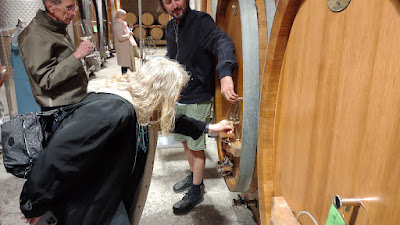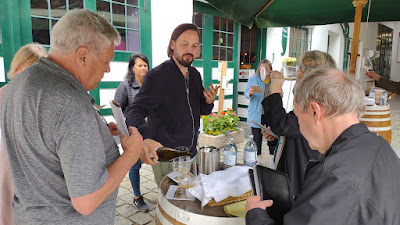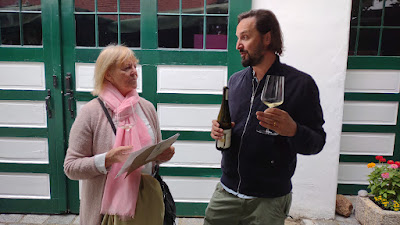Alwin Jurtschitsch is the best young producer in Austria. In a tasting, Jurtschitsch's wines blew us away. His Rieslings from Loiserberg and Heiligenstein are penetrating, lasting, and intense. Thrilling in their edge and precision, they vibrate on the tongue and sides of the mouth. The Heiligenstein Riesling is a showstopper, but we have to call out the brilliant Grüner Veltliners at this estate, too."
—Rajat Parr, Atlas of Taste
...strikingly delicious, complex, and compulsively drinkable."
—David Schildknecht
Austria 2023 by ombiasy WineTours took place from Sunday, May 28 - Thursday, June 08, 2023. We toured Austria for 12 days, starting and ending in Vienna: Wien, Wagram, Carnuntum, Burgenland, Steiermark, Wachau, Kamptal, Kremstal, Traisental, Wien.
Following:
Tour and Tasting at Weingut Steininger, Kamptal, with Brigitta Steininger - Austria 2023 by ombiasy WineTours
we visited Weingut Jurtschitsch in the Kamptal. Alwin Jurtschitsch was our host. He received us in the large court yard of Weingut Jurtschitsch with a glass of Jurtschitsch Sekt. Following a cellar tour, including tasting from barrel, we returned to the court yard for a tasting of the Jurtschitsch portfolio, both traditional and new Jurtschitsch wines.
Weingut Jurtschitsch is represented in the USA by Bowler Wines.
Weingut Jurtschitsch, Langenlois, Kamptal, Niederösterreich
This is one of Austria’s most charming family estate going back to the 16 th century. The current winery was founded in 1868. The old cellar vaults go even back to the 14 th century. This old cellar was rehabilitated in 2016 and provides today for a perfect storage space to age wines from their best single vineyard.
Since 2009 Alwin Jurtschitsch and his wife Stefanie (née Hasselbach, daughter of Germany’s famed winery Gunderloch in Rheinhessen) are at the helm. Alwin is responsible for managing
the winery and Stefanie is the winemaker. They are leaders of the natural wine movement in the Kamptal. All the vineyards are certified organic and protecting biodiversity has always been a priority.
Alwin explains that, “The more life you have in the vineyard, the more stable the entire system is.” To avoid monoculture in the vineyards, they planted many fruit trees, grass, garlic, wildflowers and butterflies fluttering amongst the vines. In the cellar they only work with spontaneous fermentation and without any chemical additions, except some minimal sulfur.
75% of the 150 acres of vineyards are planted with white varieties such as Grüner Veltliner, Riesling, Pinot Blanc and Chardonnay. 25% is planed with red varieties. In 2016 they started to push boundaries, making wines with skin contact and without sulfur.
The Jurtschitsch winery, situated in Langenlois, is one of the most prestigious wineries in Austria which impeccably displays Austrian wine culture at its best.
Alwin and Stefanie Jurtschitsch having been leading the family estate for some time now and have managed to reinterpret premium wine in their own way. For the two of them this means vinifying authentic, complex and terroir-specific wines with cool, elegant stylistics - in other words, permitting the different appellations in Langenlois to express themselves individually. The new parameters, which are in fact based on long-standing traditions form the origin for this: biological farming, healthy soils, minimal interventions in the cellar and specifically experimenting to keep on top of the endless riches hidden away in the wine world.
Before taking over the winery, Alwin and Stefanie travelled the wine world and came to the conclusion that the conversion to organic farming was essential. It is not only an ethical principle to work sustainably, but also that quality can only be achieved through healthy soils and vines, an example being the use of cow dung as fertilizer. Additionally, breaking up the monoculture wine gardens by the planting peach trees and vineyard garlic. The long-term goal is to avoid irrigation by making the vines as healthy and as autonomous as possible. As healthy vines are not only more resistant, they also produce more intense wines.
In the cellar, the commandment is minimal intervention. The wines undergo spontaneous fermentation and are sulphurized only before bottling with moderate dosage.
The interplay of conditions in the vineyard, the thoughtful and respectful handling of nature, the sensitive and gentle vinification and an open mind for "new" ways is the successful recipe for producing wines of the highest standard for Alwin and Stefanie Jurtschitsch.Weingut Jurtschitsch - Bowler
Weingut Jurtschitsch is one of the most prestigious wineries in Austria. Having previously been run by the three brothers Edwin, Paul and Karl Jurtschitsch, the family-owned winery has now been in the hands of Alwin Jurtschitsch and his wife, Stefanie Hasselbach (of Gunderloch fame in the Rheinhessen) for more than ten years.
Alwin and Stef are leaders of the natural wine movement in the Kamptal. When Alwin and Stef started working in 2006, they insisted with Alwin’s father and uncles on converting all the vineyards to organic viticulture. In the vineyards, they are continually improving how they work: replanting more densely, using whey to treat for mildew instead of using copper sulphate, and working with new pruning methods. All the vineyards are certified organic and protecting biodiversity has always been a priority. Jurtschitsch explains that, “The more life you have in the vineyard, the more stable the entire system is.” Wild life is abundant in the Jurtschitsch vineyards, with many fruit trees, grass, garlic, wildflowers and butterflies fluttering amongst the vines.
Jurtschitsch aims for a classic style of Kamptal wines, but more like an old-style of classic, that was made by their grandparents. This means, emphasizing the cool climate of Austria and making wines with finesse that strike a balance of ripe fruit and fresh acidity. Stefanie Jurtschitsch manages the winemaking and she is making wines which let the vineyards and soils speak for themselves. They only use spontaneous fermentations and work without any additions, aside from minimal sulfur. The entry-level wines are made in stainless steel, but all the single vineyard Erste Lagen wines are aged in large oak foudres. As of 2016, they have started a second line of wines called, 'Discoveries of Langenlois' which are bottled under "Alwin und Stefanie Jurtschitsch". These wines push boundaries and allow them to play outside of the classic style, opting for skin contact, and low to no sulfur. Although the two lines show different expressions, the essential is that the farming is the same and both are low intervention in the cellar; they are two sides to the same coin. The wines shine in multi-faceted elegance, offering drinking pleasure at highest level without being baroque and heavy.
Jurtschitsch - flatiron-wines
Vanguards of the natural wine scene in the Kamptal, an Austrian region
known for elegant and aromatic wines. The young couple, Alwin and Stef
(a daughter of the Gunderloch family in Germany) took over his family
estate, the oldest in the Kamptal in 2006. They’ve converted everything
to organics and gone further than that, using alternatives to copper
sulfates for sprays and protecting the biodiversity of the forests
around them.
All of that would be for naught if they didn’t also
produce some of the most elegant, traditionally-classical wines in the
region. Rieslings especially are high acid, elegant and aromatic and
still so fairly priced.
Alwin Jurtschitsch im Interview: Neue Neue Welt - Schluck Magazine
„Ich habe mir die neue Weinwelt in meine Alte mitgebracht". Der österreichische Winzer Alwin Jurtschitsch erzählt über die derzeit wohl aufregendste Naturweinszene der Welt. Die gibt es in Australien. Und Alwin Jurtschitsch hat sie mit zu sich ins Kamptal gebracht.
Alwin Jurtschitsch, das muss man kurz erklären, bevor wir anfangen, hat das österreichische Traditionsweingut Jurtschitsch übernommen und vieles dort komplett neu aufgestellt.
Ja, das stimmt. Aber ich habe auch einiges so gelassen, wie es war, weil es bekannt ist und gut funktioniert. Tradition ist immer gut, wenn du darauf aufbauen kannst. Aber du darfst halt nicht einschlafen.
Trotzdem hat sich am Weingut vieles geändert, die Art wie Weine gemacht werden, die Arbeit mit den Lagen. Da blieb vom alten Weingut Jurtschitsch nicht viel über.
Ja, wir haben die Weine schlanker gemacht und ihren Charakter geschärft. Generell gilt, dass sich jede neue Winzergeneration den Zugang zum Wein und Weinmachen neu erarbeiten muss. Wir haben recherchiert und hinterfragt und dann daran gefeilt, dass unsere Weine präziser und eleganter werden.
Du machst das ja im Team mit deiner Frau Stefanie, die ja aus einem prominenten deutschen Winzerfamilie kommt.
Ohne Stefanie wär das alles unmöglich gewesen. Liebe stellt keine Bedingungen, aber es ist einfach super, wenn der Liebespartner auch zum Arbeitspartner wird und man eine Idee teilen kann. Dann fühlt man sich, das hört sich vielleicht komisch an, bei manchen Entscheidungen nicht so alleine.
Bevor du auf den elterlichen Hof zurückggangen bist, hast du dir ja die ganze Weinbauwelt angesehen. Und in Geisenheim studiert.
Ja, Stefanie und ich haben dort sogar gemeinsam studiert. Aber zuerst bin ich nach Neuseeland gegangen. Und dort von Weingut zu Weingut getingelt und habe als Büttenträger gearbeitet, also die einfachsten Dienste gemacht. Das war eine irrsinnig tolle Zeit, denn ich war jeden Abend mit Praktikanten aus der ganzen Welt unterwegs und wir haben geredet, was im Weinbau so abgeht. Ich habe dann auch schnell kapiert, dass mir diese Welt gefallen könnte.
Danach bist du nach Australien gegangen und hast dort den Winzer James Erskine kennengelernt, mit dem dich eine enge Freundschaft verbindet. Wer ist James Erskin?
James kam gerade von seinen Wanderjahren aus Europa zurück. Er hat damals unter anderem im ehemaligen Restaurant Vau in Berlin gejobbt und eine Ernte in der Wachau am Weingut Holzapfel mitgemacht. In der alten Welt hat er seine Liebe zum Wein gefunden. Ein Quereinsteiger, der seine Materie gefunden hat im Wein. Er wollte es genau wissen. Eigentlich wäre er gerne Musiker, glaube ich, aber er hat dann doch Önologie und Bodenwissenschaften studiert und in Weingütern und Restaurants gearbeitet. Und schliesslich sein eigenes Weingut – JAUMA – James Erskine in den Adelaide Hills gegründet.
Das war im Jahr 2002. Wie war der Weinbau im Barossa Valley damals? Und wie die Weine?
Das Geschmacksbild dieser Jahre war einfach zu sehr „Neue Welt Style“. Ich denke an unzählige austauschbare Superstar Oenologen, die massenweise Monsterweine hervorzauberten. Fette Shiraz Marmelade. Etiketten mit grinsenden einheimischen Tierchen. Sowas in der Art. Ich bin dann 2014 wieder nach Australien, weil ich gehört habe, dass sich da was tut. Radikale Winzer, arge Weine. Die waren viel weiter als wir damals. Ich hatte keine Vorstellung von dieser anderen Szene.
Und was hatte sich in den über zehn Jahren geändert?
James hat mir seine „Honey-Factory“ und die ganze australische Natural Wine Szene gezeigt. Da geht es nur um Handwerk. Ungefähr so wie in der bereits etablierten Craft Beer Szene. James hat dort ein Projekt laufen, das er Natural Selection Theory laufen, was sowas wie der Urknall der australischen Natural-Bewegung war.
Klingt für meine Ohren etwas gewöhnungsbedürftig. Naturselektions-Theorien hatten manchen Leute hierzulande auch schon.
Das hat damit aber nichts zu tun. Du muss dir das so vorstellen: Drei Winzer tanzen singend und musizierend um neun große Keramik Eier herum. In den Eiern liegt die Semillon Maische, das bereits vergorene Zielmaterial dieses obskuren Weintanzes. James Erskine, Anton van Klopper von der Domaine Lucy Margaux und Tom Shobbrook wollten herausfinden, wie der pure Wein auf unterschiedliche Emotionen und Vibrationen reagiert. Wie er sich stabilisiert, ganz ohne Zusätze. Das ist diese Natural Selection Theory, ein experiementelles Wein und Kunstprojekt, beruhend auf der Theorie des japanischen Wasserforschers Dr. Masaru Emoto. Wie du dir denken kannst, ist das ein einmaliges und schräges Projekt. Doch es war so um 2010 der Anfang einer neuen Bewegung in Australien. Und der Anfang der Natural Wines / Naturweine im Land.
Und die hat dich angesteckt?
Angesteckt vom Natural-Wines-Virus war ich schon. Ich wurde ehe bestätigt, wie gut das klappt. Ich trank handwerkliche Weine, gemacht von Winzern, die einen ganzheitlichen Denkansatz haben. Vom Weingarten bis in die Flasche. Biologische Bewirtschaftung und Handlese sind selbstverständlich. Gelesen wird nach Geschmack. Reif, aber niemals überreif. Um den Wert der natürlichen Weinsäuren in den Beeren ist man sich dort bewusst. Die Weine sollen einen moderaten Alkoholgehalt haben und „trinkig“ bleiben und am besten von „dry–farmed“, sprich bewässerungsfreien Weingärten kommen. Und beim Schwefel ist man wirklich radikal minimalistisch. Nur so kann es zum lebendigen Ausdruck von Herkunft und Persönlichkeit im Wein kommen. Das ist dort der Tenor.
Auf den Fotos sieht es ja ziemlich wild aus in James Honey Factory.
Allerdings. Da lebt jemand seinen, aber auch meinen Traum. In der ehemaligen Honigfabrik gibt es ein kleines, steinernes Häuschen. Der Rest sind ein paar Holzfässer unter einem Wellblechdach, alles ein bisschen wild style. Das Weingut gleicht einer riesigen Garage und alles wirkt halt sehr improvisiert. Ein museumsreifer, rostig gelber Elektrostapler ist eine der wenigen Maschinen, die es da gibt. Nichts an der Umgebung lässt erkennen, dass James Bodenwissenschaftler mit Önologie-Abschluss ist und einmal als ausgezeichneter Sommelier des Jahres in den feinsten Restaurants tätig war.
Was braucht man also, um geile Weine zu machen?
Auf jeden Fall keinen technischen Schnick-Schnack. Ein paar Schaufeln und körperliche Fitness, Alles ist sehr einfach, es gibt nicht viel zu erklären. Handwerk eben. Das Weglassen scheint mir bei dieser Arbeitsweise die Grundphilosophie zu sein. Es ist ein Paralleluniversum zur der uns allen bekannten industrell ausgerichtete australischen Weinwelt, die ich bisher kannte.
Und dann gibt es in Australien ja auch so ein Festival der Natural-Wines, das wir nicht haben. Wie heißt das? Und wie geht es dort zu?
Es heißt Rootstock-Festival und ist eigentlich eine Parallelwelt in Flip Flops. Eh klar, dass es nach Woodstock benannt wurde. Das Root Stock findet in Sidney statt, auf einem ehemaligen Bahnofsgelände.
Sowas kennt man ja aus Berlin. Dort gibt es jede Menge ehemalige Bahnhofsgelände.
Stimmt. Wäre ja eine Anregung, oder? Das Rootstock ist ein Paradies für Sommeliers, Weinhändler und Konsumenten, eine Entdeckungsreise nach neuen Geschmäckern, Geschichten und Gesichtern. Oft versteckt hinter Bärten, Tattoos und Sonnenbrillen. Natürlich geht es hier vor allem um Identitätsfindung und Selbstdarstellung. Aber es sind keine oberflächlichen Hipster, sie wollen halt, dass sich die Persönlichkeit muss sich im Wein widerspiegelt. Und nicht nur das Terroir. Sie suchen im Gesamten die Feinstofflichkeit.
Und wie finden sie die?
Ganz einfach: trial and error. Den error verkleinerst du durch Information und Austausch. Junge Quereinsteiger diskutieren mit überzeugten Querdenkern. Viele kennen die Alte Weinwelt, also Europa, gut genug, haben zum Beispiel häufig im Burgund studiert oder ihr Praktikum an der Loire oder im Jura gemacht. Sie bringen alte Methoden heim in ihre Weingärten und Keller.
Rootstock bietet eine freie und unabhängige Plattform für diese Bewegung, die keine Mitläufer, sondern Anhänger findet. Ungezwungen passiert hier ein Paradigmenwechsel, auf den mit naturtrüben Inhalten angestoßen wird. Die junge Generation von Weintrinkern hat Durst auf neue, aufregende Weine. Und findet es einfach geil hierherzukommen und zu probieren. Jeder junge Winzer muss sein Terroir neu entdecken und interpretieren. So entsteht eine Vielfalt an Weinen mit der unverkennbaren Persönlichkeit ihrer Winzer. Ich mag diese Weinwelt, die nach ihren eigenen Regeln funktioniert. Ich habe sie mit mir in die Alte Welt gebracht.
Welche deiner Weine funktionieren und schmecken nach diesen neuen Regeln?
Es sind keine neuen, sondern eher vergessene Regeln die wieder ausgegraben wurden. Das spannendste Projekt, dass sich ergeben hat, ist eine Kooperation mit unseren guten Freunden vom Weingut Arndorfer im Kamptal: Unter dem Label „Weingut Fuchs und Hase“ vinifizieren wir Pét-Nat – Pétilliant Naturell - eine eigentlich alte Französische Schaumweinmethode bei der während der Gärung, quasi Sturm, in Sektflaschen mit Kronenkork gefüllt wird. In der Flasche gärt es weiter und so wird natürliche Kohlensäure gebildet. Die natürlichste Art von Sprudel.
Wie kann man alte Lagenweine neu aufstellen?
Aus der Lage Loiserberg kam 2013 ein spannendes Pärchen. Eine ganz klassischer Ersten Lagen Grünen Veltliner. Ein weiteres Fass bekam einfach mehr Freiheit, wurde erst nach 18 Monaten unfiltiert, und mit minimalsten Schwefel gefüllt – wild, lebendig, komplex, anders aber trotzdem ein echter Loiserberg. Es geht uns dabei darum ein bisschen mehr Free -Jazz in den Keller zu lassen.
Interview: Julia Klüber
Bilder: Alwin Jurtschitsch
Sekt Reception
Austria 2023 by ombiasy WineTours - Published and Forthcoming Postings
ombiasy WineTours: Wine Tour Schedule 2023 - Austria, Germany/East, Burgundy/ Champagne, Germany/ North
Announcement: Austria 2023 by ombiasy WineTours - 12 Days: May 28 - June 08, 2023
The Wines of Austria - Presentation by Annette Schiller, ombiasy WineTours, at the 2021 American Wine Society National Conference in Atlantic City
Wine Producer Austria - Not Only Gruener Veltliner
Summary: Austria 2023 by ombiasy WineTours
Schiller’s Favorite Spots to Drink Wine in Vienna, Austria
Dinner at an Iconic Beisl in Vienna: Griechenbeisl - Austria 2023 by ombiasy WineTours
Tour of the Monastery/ Palace Klosterneuburg and of the Weingut Klosterneuburg, with Wine Tasting - Austria 2023 by ombiasy WineTours
Wiener Schnitzel and Tafelspitz at Plachutta in der Wollzeile, Vienna. Plachutta is more than a Restaurant: it is a Vienna Institution - Austria 2023 by ombiasy WineTours
After Dinner Drinks at Vis-a-Vis Wine Bar, Vienna - Austria 2023 by ombiasy WineTours
Vienna: Viaker City Tour and Tour of Schloss Schönbrunn - Austria 2023 by ombiasy WineTours
Lunch at Restaurant Die Seejungfrau in Jois at Lake Neusiedl - Austria 2023 by ombiasy WineTours
Vineyard Tour, Cellar Tour and Tasting at Weingut Leo Hillinger, Burgenland, with Jakob Scharner, Diplom-Sommelier - Austria 2023 by ombiasy WineTours
Cellar Tour, Vineyard Tour and Tasting at Weingut Netzl, Carnuntum, with Franz, Christine and Christina Netzl - Austria 2023 by ombiasy WineTours
Lunch at Restaurant Mole West at Lake Neusiedl - Austria 2023 by ombiasy WineTours
Cellar Tour and Tasting at Weingut Anita and Hans Nittnaus, Burgenland, with Anita, Hans and Martin Nittnaus - Austria 2023 by ombiasy WineTours
Tour and Tasting at Weingut Umathum, Burgenland, with Joseph Umathum - Austria 2023 by ombiasy WineTours
2 Nights at Schloss Halbturn at Lake Neusiedl: Sekt Reception and two Dinners - Austria 2023 by ombiasy WineTours
Tour and Tasting at Weingut Steindorfer, Burgenland, with Ernst and Roland Steindorfer - Austria 2023 by ombiasy WineTours
Light Lunch at Gránátos Étterem at Esterházy Kástely in Fertöd, Hungary: Hungarian Goulash Soup and Esterházy Cake - Austria 2023 by ombiasy WineTours
At the Liszt House in Raiding, where the Great Pianist, Romantic Composer and Conductor was Born - Austria 2023 by ombiasy WineTours
Tasting at Weingut Straka, Rechnitz, Burgenland, with Thomas Straka - Austria 2023 by ombiasy WineTours
High-end Sleeping and Eating in the Vineyard: Wohnothek am Ratschen and Restaurant am Ratschen (16/ 20 Gault Millau), Deutsch-Schützen - Austria 2023 by ombiasy WineTours
Tasting at Weingut Wachter-Wiesler, Burgenland, with Julia Wachter - Austria 2023 by ombiasy WineTours
Tour, Tasting and Lunch at Weingut Jalits, Burgenland, with Mathias Jalits - Austria 2023 by ombiasy WineTours
Tour and Tasting at Weingut Neumeister, Straden, Vulkanland, Steiermark, with Christoph Neumeister - Austria 2023 by ombiasy WineTours
Dinner with a View at Weinrefugium Brolli, Steiermark - Austria 2023 by ombiasy WineTours
Tour and Tasting at Weingut Sattlerhof, Steiermark, with Justė Sattler - Austria 2023 by ombiasy WineTours
Tour and Tasting at Weingut Wohlmuth, Steiermark, with Maria Wohlmuth - Austria 2023 by ombiasy WineTours
"Brettljause" and Wine at Buschenschank Trummer, Weingut Trummer, with Jürgen Trummer - Austria 2023 by ombiasy WineTours
Tasting at Weingut Polz, Strass, Südsteiermark, with Sommelier Philipp Heidenbauer - Austria 2023 by ombiasy WineTours
Tour and Tasting at Weingut Tement, Steiermark, with Sommelier Andy Bodor and Manfred and Heidi Tement - Austria 2023 by ombiasy WineTours
"Steierisches Backhendl"-Lunch at Weingut Tement/ Restaurant Magnothek, Südsteiermark - Austria 2023 by ombiasy WineTours
Gustav Mahler, Sinfonie Nr. 3, at Graz Opera, Steiermark - Austria 2023 by ombiasy WineTours
In Eisenstadt, Burgenland: Tour at Haydn House, Lunch at Restaurant Henrici, Tour at Esterhazy Castle - Austria 2023 by ombiasy WineTours
At Loisium Wine & Spa Resort Langenlois, Kamptal: Impromptu Steininger Sekt Reception with Eva Steininger and Klaus Wittauer - Austria 2023 by ombiasy WineTours
Wine-pairing Dinner at Heurigenhof Bründlmeyer (14.5/20 Points Gault Millau) - Austria 2023 by ombiasy WineTours
Tour and Tasting at Weingut Steininger, Kamptal, with Brigitta Steininger - Austria 2023 by ombiasy WineTours
Tour and Tasting at Weingut Jurtschitsch, Kamptal, with Alwin Jurtschitsch
Lunch at Braugasthaus zum Fiakerwirtin Langenlois, Kamptal
Tasting at Weingut Markus Huber, Traisental, with Markus Huber
2 Days in Dürnstein, Wachau, at Hotel Richard Löwenherz
Martin Mittelbach
from the "Tegernseehof" and Klaus Wittauer from "KWSelection" Presented
Tegernseehof Wines and Stefan Trummer and Chef Austin Fausett from
“Trummer’s on Main” in Clifton Austrian Appetizers at the Austrian
Embassy in Washington DC, USA
Vineyard Walk and Tasting at Weingut Tegernseerhof, Wachau, with Owner/ Winemaker Martin Mittelbach
Tour and Tasting at Domäne Wachau, Dürnstein, Wachau
Tasting and Dinner at Weingut Nigl, Kremstal, 13.5 Points Gault Millau
Vintage 2011 Tasting with Lucas Pichler, Weingut F.X. Pichler, with Dirk Wuertz at his Koenigsmuehle in Rheinhessen, Austria/Germany
Tour and Tasting at Weingut F.X.Pichler, Wachau, with Lucas Pichler
Tasting at Weingut Matthias Hager, Kamptal, with Doris Hager
Lunch at Gasthaus Gutmann, Zöbing, Kamptal
Tour and Tasting at Weingut Schloss Gobelsburg, Kamptal, with Stefan Tabery


































No comments:
Post a Comment